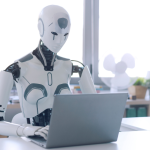With digital transformation reshaping society, the discussion around future professions is becoming increasingly relevant. Kelsem Ricardo Rios Lima, an expert in technological dynamics and the new professional profile demanded by the market, emphasizes that preparing for the future starts with understanding today’s changes. The rapid advancement of artificial intelligence, automation, and digital tools is directly impacting the job market, requiring a reassessment of valued skills and traditional career paths.
Professions are no longer static—they are becoming more adaptable and multidisciplinary, incorporating innovation, critical thinking, and refined human capabilities.
Future Professions: Innovation with Purpose and Flexibility
Future careers are not limited to the tech sector, even though it leads much of the transformation. Companies now seek talent capable of adapting, mastering digital tools, and applying strategic thinking. Roles such as artificial intelligence engineer, innovation manager, data analyst, user experience (UX) specialist, and climate scientist represent growing fields.
However, human skills are also gaining value. Careers related to emotional health, digital education, social inclusion, and sustainability are coming to the forefront, requiring empathy, leadership, and ethical responsibility. This combination of technical knowledge and socio-emotional skills is a key differentiator in today’s professional landscape.
According to Kelsem Ricardo Rios Lima, professionals who combine digital fluency with a human-centered perspective will be better positioned to lead processes, propose creative solutions, and generate real impact in society.
Essential Skills for the New Job Market
More important than choosing a future profession is developing the skills that support this new profile. The most in-demand competencies go beyond technical expertise. Among the most valued are:
Continuous learning ability;
Autonomy in solving complex problems;
Collaboration in hybrid environments;
Creativity applied to innovation;
Clear and empathetic communication.

These are transversal skills—applicable across various areas and roles. As such, professional education must be reimagined. Teaching models that employ active methodologies, interdisciplinary projects, and hands-on experiences are gaining prominence in preparing youth and adults for a constantly evolving world.
Kelsem Ricardo Rios Lima notes that modern professionals must accept that their careers will be composed of diverse phases, with changes in direction, constant updates, and an open mindset toward the new. This dynamic demands resilience, curiosity, and the courage to reinvent oneself.
Promising Sectors and Career Paths
Several fields are emerging as fertile ground for future professions. Information technology remains a key player, with high demand for cybersecurity specialists, industrial automation experts, and software developers. The healthcare sector is expanding roles related to telemedicine, emotional well-being, and applied genetics.
In education, there is growing demand for instructional designers and digital content curators. Sustainability also stands out, driving professions linked to clean energy, ESG (environmental, social, and governance), and the circular economy. In the creative sector, influencer marketing, content production, and immersive design are gaining traction.
As Kelsem Ricardo Rios Lima analyzes, the future of work is less about formal titles and more about adaptable skills and a sense of purpose aligned with society’s evolving needs.
Conclusion: The Future Has Already Begun
The professions of the future are not distant predictions—they are already being shaped by current realities. Investing in continuing education, developing transversal skills, and cultivating an innovative mindset are essential steps for anyone aiming to thrive in this new era of work. With the insights of experts, it becomes clear that professional success will increasingly depend on the ability to keep learning, act with purpose, and create solutions that unite technology, ethics, and social impact.
Author: Eura Tymal







